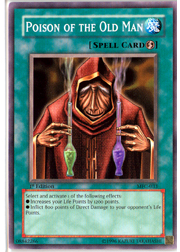Entrants arriving for today’s Last Chance Qualifiers were in for a surprise—a brand-new end-of match procedure. Revised to offset the unsatisfying “first blood” kinds of wins that were prevalent under the last procedure, this system should reduce the effectiveness of “stalling” and cut some of the luck out of sudden death.
Here’s the current procedure, which is in effect starting July 1:
“When time is called at the end of the round, the current turn of each game still in progress is completed. If a winner is not determined by the end of that turn, play will continue for an additional 3 turns, starting the count with the opponent’s turn. The play stops and the match winner is calculated using the following process:
If at the end of the additional 3 turns, a winner has not been determined, the player with greater life points wins that game. If life points are equal, continue play until the first change in life points. Always resolve all effects that are already on the chain before comparing the life points of the players.
After determining the winner of the game in progress, the player wins the match if he or she has more game wins than the opponent. If both players have an equal number of game wins, then they start a new game, which will last for a maximum of 4 turns, 2 for each player. Side decks may not be used before starting this game. At the end of the 4th turn, the player with the greatest life points wins the match. If life points are equal, continue play until the first change of in life points always resolve all effects that are already on the chain before comparing the life points of the players.
If players are between the games when time is called, and one player has greater game wins, that player wins the match.”
This is a big change to implement the day before U.S. Nationals. There are plenty of decks out there designed to stall, stall, stall, draw, draw, draw, and force a sudden death match, which is then side decked full of direct damage or life gain cards. This was an effective tactic under the old procedures, and a source of irritation for players and headaches for judges.
Under the new procedure, each player will get two turns in any ongoing game after time is called, unless someone has managed to win during the current turn. By “win,” I mean reduce your opponent’s life points to 0, draw all five pieces of Exodia, or get all your Destiny Board pieces—a definite, honest-to-goodness win condition. If no one wins during that turn, play will continue for three more turns, giving each player two additional turns. Once those turns have ended, if no one has won, life points are compared and the highest total wins the duel. Tied life points will result in play continuing until the first change in life points, and whichever player’s life points are highest will win the duel.
Likewise, side decking is no longer allowed if a duel starts after time has been called. The new duel will consist of four turns—two turns for each player, and highest life points at the end determines the winner. The above procedures will be followed if points are tied at the end of the fourth turn. Sudden death strategies involving side-decked cards have been effectively stifled.
 These changes should have a big impact on what people are playing in Nationals, as some deck types won’t fare so well. Self-Destruct Button isn’t quite as viable, and Last Turn as a stall-then-burn approach won’t be as effective. Side decks will probably see the most alteration—do you hear that subtle roar? That’s the sound of the multitudes dumping Poison of the Old Man out of their side decks. And while you might think, “Hmm, this is going to stretch rounds out if people play to time. Adding on three extra turns is going to make the event day a lot longer,” consider that stalling is going to lose a lot of its utility. Without an automatic sudden-death rule and the ability to side deck in cards designed to win that sort of duel, there’s less of an incentive to stall. Less stalling means fewer matches will go to time! Hurrah!
These changes should have a big impact on what people are playing in Nationals, as some deck types won’t fare so well. Self-Destruct Button isn’t quite as viable, and Last Turn as a stall-then-burn approach won’t be as effective. Side decks will probably see the most alteration—do you hear that subtle roar? That’s the sound of the multitudes dumping Poison of the Old Man out of their side decks. And while you might think, “Hmm, this is going to stretch rounds out if people play to time. Adding on three extra turns is going to make the event day a lot longer,” consider that stalling is going to lose a lot of its utility. Without an automatic sudden-death rule and the ability to side deck in cards designed to win that sort of duel, there’s less of an incentive to stall. Less stalling means fewer matches will go to time! Hurrah!
I’ll resume this topic during Nationals, as I’m interested to see what impact the change has on what and how people play and what the players think of it. Return to Metagame.com to find out how the players (and judges) will respond to such a significant shift in the game!